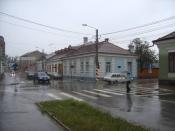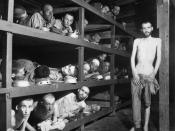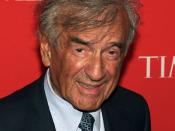"Necessity is the mother of invention". This is a very famous quote that is widely accepted worldwide. But when invention is impossible, something else must be compromised to compensate this need. When people are pushed over the edge and do not have their physical needs met, they turn to invention's brother, "Corruption" and become corrupted and become callused to the suffering and pain of others. There are many examples of this in Elie Wiesel's, Night. Three examples of this in the book are when Rabbi Eliahou is abandoned by his son, when the men of the train fight each other, and when Wiesel is emotionally unaffected by his own father's death.
The first example of this corruption in Night was how Rabbi Eliahou's son abandoned his father while being transported to another camp. Believing that he could not cope with the hunger and strain and take care of his father, Rabbi Eliahou's son purposely ran ahead of his pack and let his father lag behind trying to abandon him, so he could free himself of this burden.
Adversely, Rabbi Eliahou thought that it was an accident and continued to search for his son. When Rabbi Eliahou confronted Elie to see if he knew the location of his son, Elie thought, "A terrible thought loomed up in my mind: he had wanted to get rid of his father! He had felt that his father was growing weak, he had believed that the end was near and had sought this separation in order to get rid of the burden, to free himself from an encumbrance which could lessen his own chances of survival". (87) This statement proves that the boy could not endure the strain and grew so desperate, that he abandoned his beliefs and what he cared about to survive.


